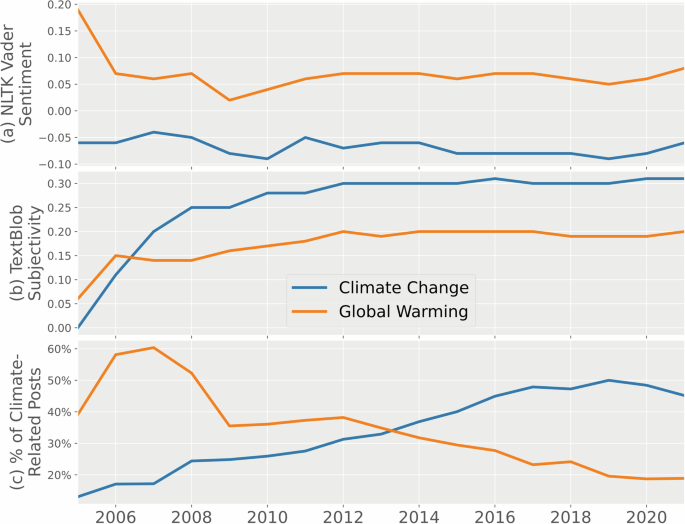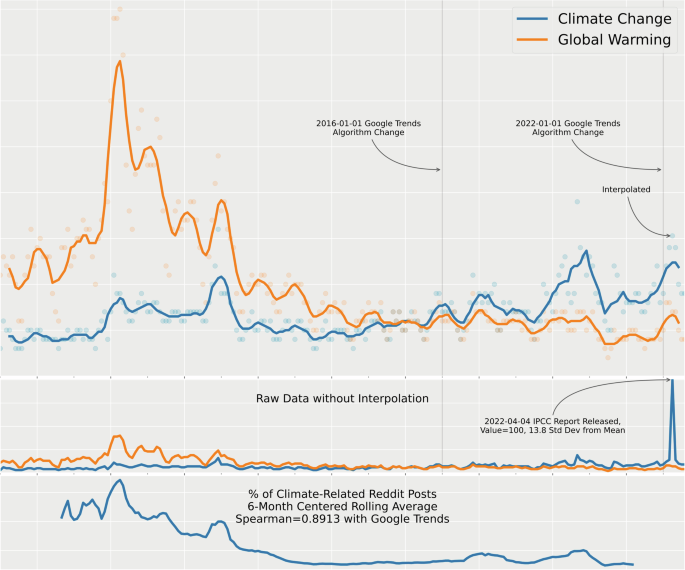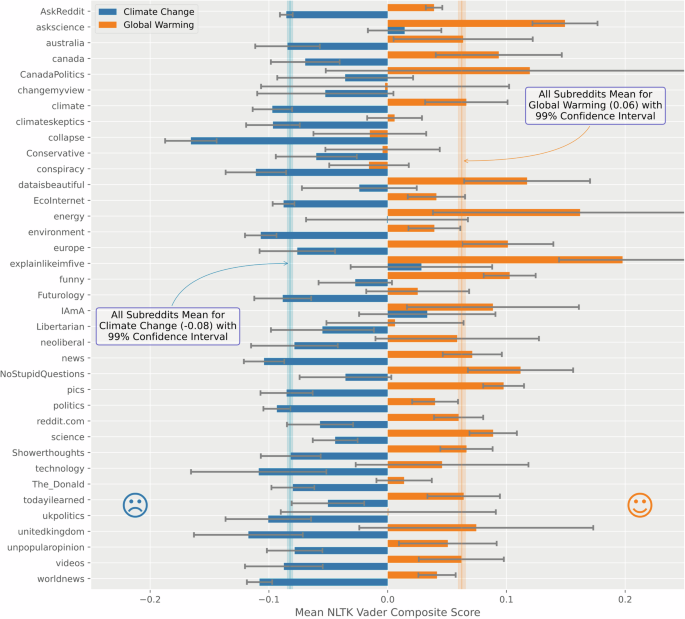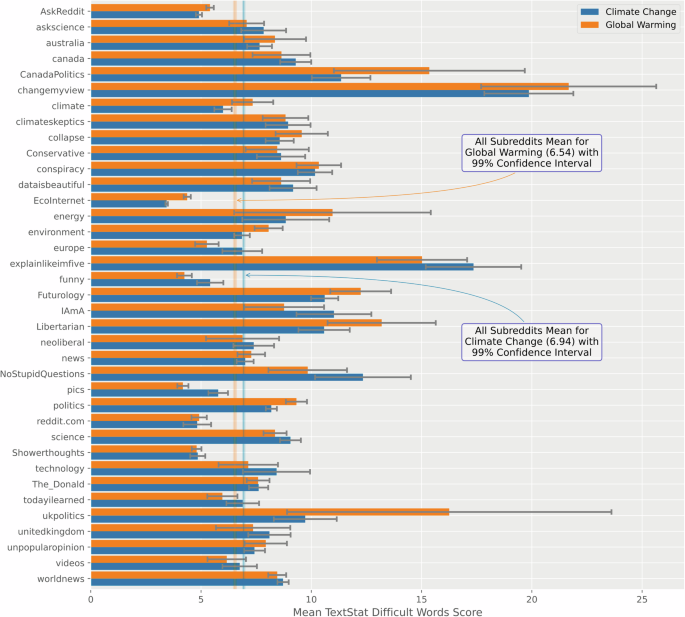Our analysis confirms the lexical transition from global warming to climate change indeed took place, albeit a decade later than the Republican initiative purportedly instigating this shift. This change was abrupt, with climate change becoming the dominant term in the discussions analyzed around 2013, as illustrated in Fig. 1. This shift in terminology is further corroborated by Google search trends that reveal a parallel change occurring around two years later, as shown in Fig. 2. These findings suggest a broad adoption of the term climate change in both digital discourse and search behaviors during this period, reflecting broader societal and political shifts.
This figure shows the frequency of usage and associated sentiment and subjectivity of the terms “global warming” and “climate change” in Reddit posts over time. a The bottom section illustrates the decline in the use of “global warming” and the corresponding rise in “climate change” since 2005. c The top section depicts the sentiment associated with “climate change” becoming more negative over time, while b the middle section highlights that the subjectivity of both terms has increased, with “climate change” consistently being discussed in more subjective language compared to “global warming” since 2005. File: Fig. 1 Climate Related NGram Properties by Year 2005 to 2021.svg.
This figure shows the Google search term trends for climate change and global warming for the 18 years from January 2004 to August 2022. The top panel shows the 6-month rolling average lines with the light dots delineating the non-averaged data points with the exception of the month of the 2022 IPCC report, where an interpolated point (mean of 5 surrounding points) was used to mitigate the exceptional outlier shown in the middle panel. The bottom panel shows the 6-month rolling average of the relative percentages of all climate-related posts, namely the blue line in Fig. 5. Vertical lines represent the dates on which Google implemented algorithmic changes to how it tracks searches. In April 2022, the month during which the IPCC released its most recent and most alarming report, there was a large spike in searches reported; however, we are unable to ascertain if the two are related. File: Fig. 2 Google Search Trend Scores from 2004 to 2022 for Climate Change and Global Warming.svg.
Furthermore, extending our investigation into Google Trends data from 2004 to 2021, well beyond those previously analyzed in studies focusing on searches before 20146,22, we found a similar shift in terminology from climate change to global warming around 2015 beyond Reddit. This alignment between Reddit discussions and Google search trends, despite the slight difference in timing, supports the consistency of this lexical evolution across various Internet platforms. Additionally, the six-month rolling averages for the sum of the two Google trend lines, which approximately represent the overall climate-related searches over time, show a strong correlation (Spearman correlation coefficient of 0.89) with the percentage of Reddit discussions about climate-related topics (see Fig. 2). This correlation further suggests that the trends observed in Reddit discussions are reflective of broader trends across Internet-based media, underscoring the pervasive shift in how climate issues are discussed online.
Although some prior studies viewed the terms somewhat interchangeably in traditional mass media from 1995 to 200423, more recent studies suggest important differences. For example, one study found that the term global warming elicited lower levels of belief in the phenomenon, especially among Republicans, while the term climate change elicited higher levels of belief, particularly among the same group24. Another study found that red states (i.e., more conservative states in the United States) tended to prefer the term global warming while blue states (less conservative) tended to prefer the term climate change25. More recently, one study found that on Twitter/X global warming was more closely associated with human causation and conveyed more of an immediate and direct impact, whereas climate change appeared to be a broader term that could be framed as a natural phenomenon, potentially downplaying the necessity for human intervention26. Another study found that tweets mentioning climate change were more likely to be associated with environmental and political content, whereas tweets using global warming were more likely to be linked to weather (including heatwaves) and energy, and the authors suggested that terminology may influence public perception and engagement15. A 2014 survey of 1657 adults found that people reported using and hearing global warming far more often than climate change—45% of the time vs. 12% and 35% vs. 16%, respectively22; although the term preferences are consistent with our study’s observed shift in Reddit and Google Search Trends around that time, the considerable difference between the perceived frequencies and those observed suggests there may be important underlying factors that require further investigation.
The analysis of the TextBlob subjectivity scores revealed a significantly higher level of subjectivity in posts pertaining to climate change (Fig. 1) suggesting that individuals discussing this term tend to express their perspectives in a less objective manner. Conversely, discussions labeled under global warming were characterized by a tone suggesting objective factuality. This distinction may imply that contributors discussing climate change are potentially more vigilant in differentiating between opinion and fact. Such an observation is aligned with expectations and underscores a critical discourse dynamic: it appears that those referring to global warming may be more likely to perceive their viewpoints as unequivocal truths. This distinction in discourse styles not only illuminates differing perceptions but also potentially influences the public and policy discourse surrounding climate issues. In short, the choice of terms may significantly impact how the underlying phenomenon has been received.
Our analysis challenges prevailing assumptions by demonstrating that the term global warming is associated with more positive sentiment compared to climate change. An average positive sentiment was consistently observed over all time periods analyzed for global warming, whereas climate change corresponded with predominantly negative scores (Fig. 1). This disparity may suggest that individuals discussing global warming are less apprehensive about climatic changes than those using the term climate change, possibly reflecting a delay in adopting the newer terminology. Notably, the subreddit askscience, known for its scientific rigor, displayed the most positive sentiments for both terms and had some of the highest composite scores (Fig. 3). Contrasting with a 2015 study6, which utilized Semantria® to analyze Twitter/X sentiments over two months, our broader assessment over 15 years using VADER sentiment scores uncovered an opposing trend, aligning more closely with sentiment self-report survey results from 201422. This incongruence underscores the need for further exploration into the dynamics shaping sentiment. It is notable that during Donald Trump’s first presidency, there was a modest decrease in both sentiment polarity and subjectivity within discussions of climate change and global warming. Contributions during this period trended toward more negative tones and were phrased more as declarations of fact than expressions of personal viewpoints. The underlying reasons for this shift in discourse style remain unclear and warrant further investigation.
This figure depicts the mean NLTK Vader Sentiment Composite Score for climate-related posts containing the terms “climate change” or “global warming” across all subreddits, which are plotted as vertical lines with the shaded area representing the 99% confidence interval while the bars represent the mean for each of these for a given subreddit with the error bars showing the 99% confidence interval for that given subreddit and term. The subreddits (37 total) were selected by choosing the 50 highest-volume subreddits with more than 100 climate-related posts. File: Fig. 3 Mean Vader Composite by Subreddit.svg.
As illustrated in Fig. 3, the term climate change consistently registers less favorable Vader sentiment scores compared to global warming across various subreddits, regardless of the spectrum of views on climate validity presented by these forums (such as The Conservative, The_Donald, and conspiracy versus climate, askscience, and science). This pattern indicates that the more positive sentiment typically associated with global warming transcends political and scientific divides. Notably, subreddits dedicated to educational content, including askscience, explainlikeimfive, and IAmA, tend to adopt more positive tones in their discussions. This consistency suggests a broad, enduring perception gap between the two terms.
We observed that posts containing the term climate change exhibit a small but statistically significant increase in the use of complex vocabulary across all subreddits. However, this trend does not consistently manifest within individual subreddits or across different forums (refer to Fig. 4). The subreddit aimed at changing the original poster’s (OP) views displayed the highest usage of complex words in discussions related to climate topics. Paradoxically, the subreddit explainlikeimfive, which is intended to simplify complex subjects for easier understanding, had the second-highest average use of complex vocabulary in its posts.
In this figure, the mean TextStat Difficult Words score for all posts containing the terms “climate change” and “global warming” across all subreddits are plotted as vertical lines with the shaded area representing the 99% confidence interval while the bars represent the mean for each of these for a given subreddit with the error bars showing the 99% confidence interval for that given subreddit and term. The subreddits (37 total) were selected by choosing the 50 highest-volume subreddits with more than 100 climate-related posts. File: Fig. 4 Mean TextStat Difficult Words Score by Subreddit.svg.
When considering the proportion of Reddit posts addressing climate-related topics, a noticeable decline is observed. From 2005 to 2010, up to 1.4% of discussions were climate-related. However, this percentage has since shown a steady decline, ultimately averaging around 0.1% of posts by 2021 (Fig. 5). This apparent decrease may be somewhat misleading due to the overall growth in Reddit’s popularity, which could disproportionately affect the perceived share of climate discussions. In reality, while the absolute number of climate-related discussions has continued to increase, the expansion of conversations on other topics has outpaced them. Despite the actual increase in climate discussions, this trend suggests a relative decrease in engagement with climate issues within the Reddit community, serving as a subtle indicator that the topic may be diminishing in proportional popularity.
This figure shows the relative frequency of climate-change-related topics in time as a percentage of discussions on Reddit. The discussion frequency has been trending down over the time period analyzed. File: Fig. 5 Percentage of All Reddit Posts Matching Climate-Change Related Terms.svg.
As an additional observation, our analysis of word difficulty revealed that the ecointernet subreddit utilized the least complex language in discussions pertaining to climate change, global warming, and climate topics in general (see Fig. 4). Conversely, the Changemyview subreddit, which often hosts debates and confrontational dialogs, exhibited the most complex sentence structures, likely due to a reliance on academic sources and technical language. Surprisingly, the Explain to Me Like I’m 5 (explainlikeimfive) subreddit, which aims to simplify concepts, employed more complex vocabulary than other forums
Our findings deepen the existing literature by offering a comprehensive analysis of Reddit discussions, contrasted against broader search term trends, thereby enhancing our understanding of the evolution of climate discourse across diverse online platforms.




